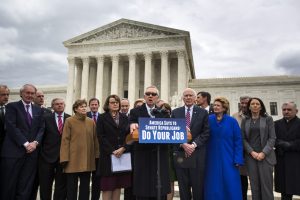
Washington, Oct 1 (EFE).- The White House and Congress are not the only government institutions up for grabs in the November elections. With their vote, U.S. citizens will also indirectly decide the politics of the Supreme Court, whose nine judges will have the power to decide much of the country’s future.
The outcome of the coming elections, whatever it turns out to be, will have a significant and lasting effect on the Supreme Court, according to professor Laura E. Little at Philadelphia’s Temple University School of Law.
The reason is that the next occupant of the White House will have the power to choose not only the substitute for conservative Justice Antonin Scalia, who passed away unexpectedly las February and has not yet been replaced, but also the possible replacement of some of the older justices who make up the high court.
In January 2017, when either Democrat Hillary Clinton or Republican Donald Trump will become president, three justices will be more than 78 years old, the average age when Supreme Court justices have hung up their black robes since 1960.
According to the experts, the three judges most likely to leave office soonest are the conservative Anthony Kennedy, 80, the liberal Stephen Breyer, 78, and the progressive Ruth Bader Ginsburg, 83.
The high court, normally made up of nine justices, has held onto a conservative majority since 1972, when Republican President Richard Nixon (1969-1974) nominated its fourth justice and halted the social revolution that had gained strength in the court with verdicts in favor of unions and against racial discrimination.
If Hillary Clinton wins the election, the Supreme Court could be composed for the first time in decades of a progressive majority – and that has unleashed terror on the right, opposed as it is to same-sex marriage and abortion, and a stout defender of the right to bear arms.
For his part, Trump has promised that if he wins the White House, he will name only judges that are anti-abortion, a commitment have has helped dispel criticisms of those who don’t consider him “sufficiently conservative” because of his previous stance in favor of a woman’s right to choose.
To fill the vacancy of the conservative Scalia, U.S. President Barack Obama has already nominated Judge Merrick Garland, a moderate that the Senate’s Republican majority has refused even to grant even a hearing, marking time a record 199 days during which the nomination has remained blocked.
Senate Republicans have insisted again and again that the next president should choose the new high court justice after taking power in January 2017, for which Senate Democrats have called them “irresponsible” an “obstructionist.”
But the importance of the Supreme Court as the third branch of government in the United States could take center stage earlier than expected.
If Trump and Clinton end in a virtual tie in the November elections, something similar to what happened in the year 2000 could occur, when the Supreme Court ended an interminable recount of votes in Florida by pronouncing Republican George W. Bush the winner over Democrat Al Gore, a decision reached by justices sticking to their ideological preferences.
Those same ideological differences could influence the future in United States of such important issues as Obamacare, the financing of political campaigns, the right to vote, and positive policies on behalf of black and Hispanic minorities.
Specifically, analysts say a high court with a majority of progressive justices could limit the death penalty, which it reestablished in 1976 but which, since then, has been suspended in a growing number of states.
Since Justice Scalia died last February, the powerful National Rifle Association (NRA) lobby has warned that a Clinton presidency would leave U.S. citizens “defenseless” by appointing justices bent on ending their right to bear arms, protected by the Second Amendment of the Constitution, though experts say that no decision ever handed down by the high court has indicated that progressive justices would ban that Second Amendment right.
With a mission of impartiality, the Supreme Court has always tried to separate itself from the other branches of government, though on this occasion there is apparently no other choice for it than to accept the destiny decided at the polls, which unites it to the White House and Congress.
